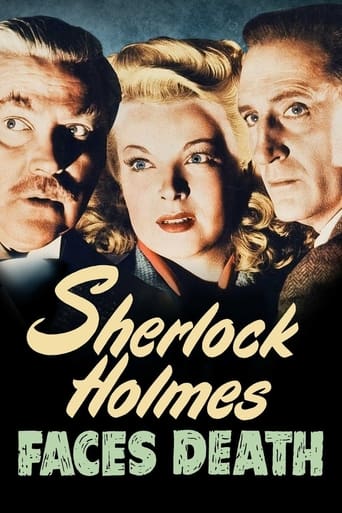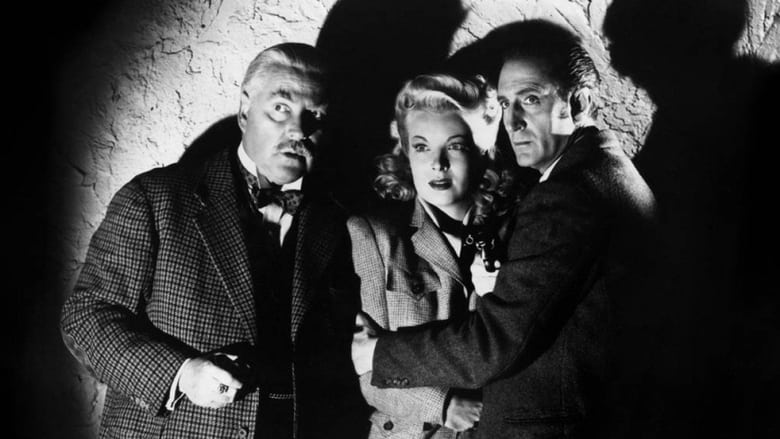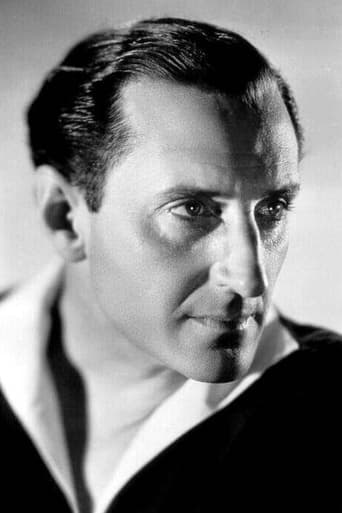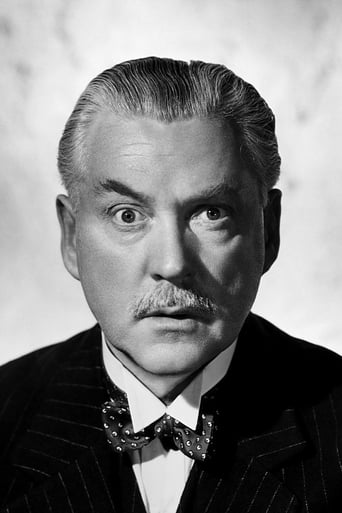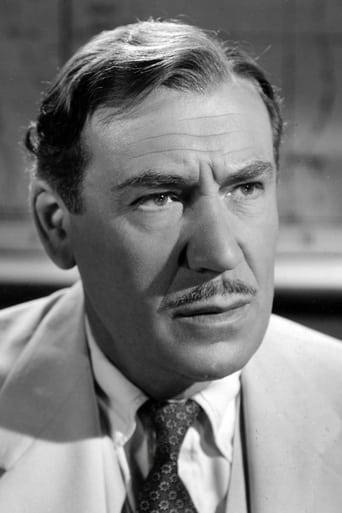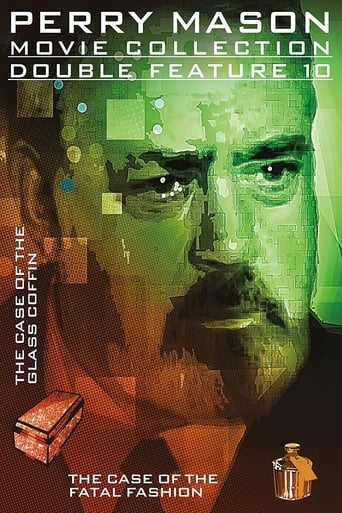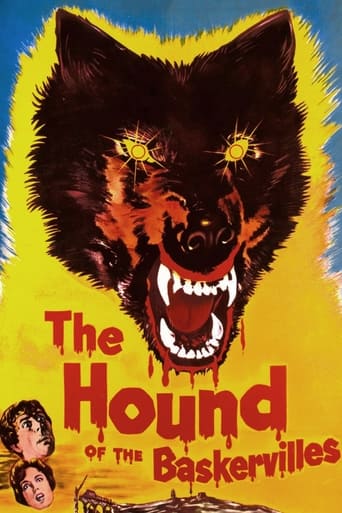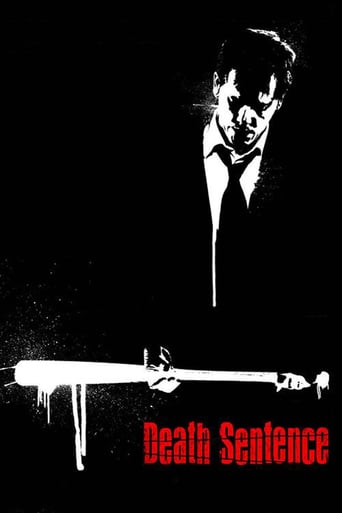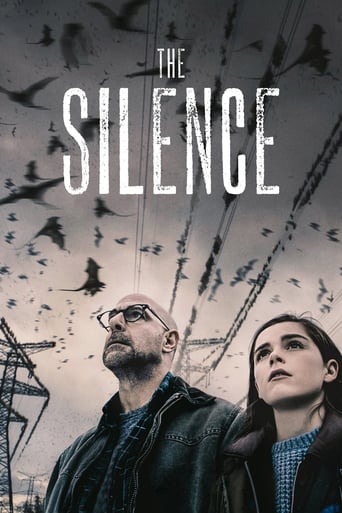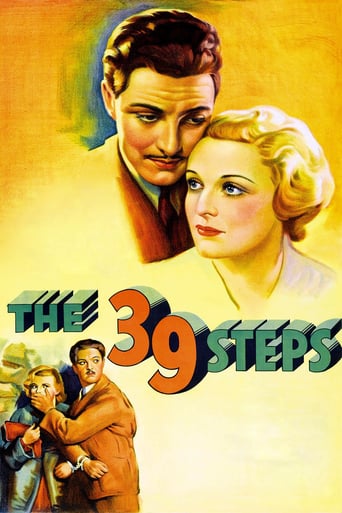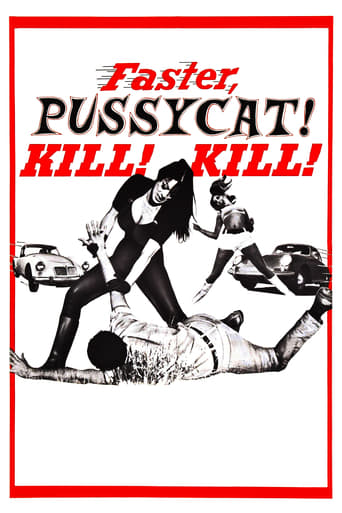Sherlock Holmes Faces Death (1943)
During WWII several murders occur at a convalescent home where Dr. Watson has volunteered his services. He summons Holmes for help and the master detective proceeds to solve the crime from a long list of suspects including the owners of the home, the staff and the patients recovering there.
Watch Trailer
Cast


Similar titles
Reviews
Wonderful Movie
Overrated and overhyped
Excellent but underrated film
The film makes a home in your brain and the only cure is to see it again.
Review - Sherlock Holmes Faces Death 9-17-43 6th in the Series The storyline has Dr. Watson overseeing the needs of convalescing soldiers from WWII battles, each suffering some traumatic incident, resting at the historic centuries old Musgrave Manor, also occupied by three Musgrave's, two of which shall meet with a fatal end, plus the butler is killed, too. It is for Holmes to find the killer of the three gentlemen through whatever clever means possible. Holmes gives Bob Sexton multiple reasons he is the killer. The man who murdered the Musgraves, with such a sure hand, would never have missed killing Sexton. Also, Dr. Sexton examined both bodies, but failed to report the real cause of death. The case of systemic needles in his possession found earlier by Holmes, just after Geoffrey Musgrave was found murdered. Matrimony was motive, Miss Sally was the object of Sexton's affections. He planned on marrying Sally Musgrave in order to gain possession of the estate. Sexton claimed he knew nothing about the game of chess, but he named the square in chess parlance, when Holmes suggested he must have moved off it. Holmes finds a button on the cellar floor, asking Sexton if per chance it was his button. Sherlock Holmes faces death from Dr. Sexton, stating he thinks he could manage killing Holmes with one shot. He fires, Holmes goes down, Sexton rises to the next level, with Lestrade, Watson and policemen waiting for him. Sexton fires at all of them, but Holmes admits he put blanks in the weapon. Holmes asks Watson if he heard his confession. Watson acknowledges hearing it all. Lestrade heard likewise. Holmes admits to the risk being alone in the crypt with a killer, even with blanks, and adding, these egomaniacs are always so chatty, when they seem to have the upper hand. Some notable appearances included the following: The series' movies with Dennis Hoey portraying Lestrade and Hillary Brooke as a heroine are my favorites. Milburn Stone looked a young 39, in this 1943 release, no matter what his actual height, he played his part well, although briefly, in only two scenes. A very young Peter Lawford, appearing, at 20, in the opening scene at The Rat and The Raven. A bit of whimsey includes the following: When the proprietor tells of the raven in the bar coming from Musgrave Manor, it does seem a little far-fetched, but I suppose the scavenger bird could have travelled from the spooky estate to the pub. Question is, why did he let it in the establishment? Answer, it coincides with the name of the place. Rated high on favorites list in series based on the mystery, the cumulative clues, the background of the Manor, the pub and the characters; most of all how Holmes put all parts together to catch the killer.
Murky shadows and flashes of lightning, stormy nights and wind-blown curtains, a cold hard-bitten housekeeper and sliding panels that lead to secret passages, a mysterious family verse and a clock that strikes 13 times turn an eerie old manor house into an ideal background to murder and intrigue in "Sherlock Holmes Faces Death." Doctor Watson is tending convalescing soldiers, the only allusion to World War II, at isolated Musgrave Manor, when Geoffrey Musgrave, the elder of three siblings, is found murdered. Watson goes to London and enlists the aid of his friend and partner, Sherlock Holmes, who returns to the manor with him to find the killer. The fourth film in Universal's Holmes series turns from battling the spies and Nazis that propelled the prior three wartime films to a timeless self-contained setting that differs little from the Victorian era of the initial two Twentieth Century Fox films. Director Roy William Neill, who is now also credited as producer, directs his second Holmes film with a sure and experienced hand. While Charles Van Enger's cinematography may lack some of the dramatic lighting of earlier Holmes outings, the photography is appropriately lit with deep heavy shadows and creates the necessary air of mystery that haunts Musgrave Manor.Once again, Universal assembled a fine cast of players. Of course, Basil Rathbone and Nigel Bruce are back, and, after playing the roles six times, both veterans now inhabit their iconic persona with authority. Dennis Hoey and Mary Gordon also return as Inspector Lestrade and Mrs. Hudson, respectively. Hilary Brooke makes the second of her three appearances in the series as Sally Musgrave, and her beau is played by Milburn Stone, who would go on to play Doc in the long-running "Gunsmoke" television series. Familiar faces from countless films play convalescing soldiers, and an early pub scene features Norma Varden, a Hitchcock veteran, as the bar maid and, in a brief one-line role, a pre-MGM Peter Lawford as a soldier.Based on Conan Doyle's "The Adventure of the Musgrave Ritual," Betram Millhauser's screenplay uses a ruse familiar from "Sherlock Holmes and the Voice of Terror," and sharp viewers will identify the murderer from a slip of the tongue. But despite the over-utilized who-dunnit mechanics, the plot is thick enough to engage the intellect of Holmes and hold viewers' attention throughout the brief 68-minute running time. While Holmes does not deliver a final patriotic speech, he does conclude the film with an inspirational hope for the future of mankind, a satisfying finale to a better-than-average entry in the series.
Perpetually battered by violent storms, the impossibly creepy Musgrave Manor is an unlikely place to find a convalescent home for WWII soldiers suffering from post-traumatic stress, but it's where we find Dr. Watson (Nigel Bruce) doing his bit for the war effort by helping the psychologically scarred recover from their battle fatigue. With the answer to a centuries-old family secret laying hidden in its dusty cellar, a prize worth millions in the wrong hands, the manor is also a prime location for murder, meaning that it isn't long before Watson is joined by his old pal Holmes (Basil Rathbone).Faces Death isn't one of the strongest of the Rathbone/Bruce Holmes series, lacking a truly challenging mystery for the great detective (the chess-based clues hidden in an ancient family rhyme being far too easy to solve for a brainiac like Holmes). The film also suffers from some irritatingly farcical antics from Scotland Yard's inept Inspector Lestrade and a somewhat out-of-place optimistic rant from Holmes designed to stir patriotism and raise wartime morale, but which these days seems depressingly poignant considering the current sad state of the country (as I type, England is licking its wounds after four days of mindless rioting in its major cities).Thankfully the film compensates for its sillier moments, less than ingenious plot, and Holmes' misguided positivity about England's future with plenty of atmosphere and lots of overtly Gothic trappings—who doesn't love tried and trusted murder/mystery elements such as a creepy manor replete with secret passageways, a pair of sinister housekeepers, a clock that strikes thirteen, and an assortment of dead bodies popping up all over?
Sherlock Holmes, who was born January 6, 1854, came out of retirement in 1942 at the request of Universal Pictures to pursue WWII arch criminals threatening Britain and frightening aristocratic young women. Now 88, Holmes uses a substance much like Botox, hair dye and a high fiber diet to maintain that familiar appearance so many have commented on, to his intense irritation, as resembling the actor Basil Rathbone. He is, as always, aided by his companion, Dr. John Watson, now 90, and resembling Nigel Bruce, who over the years preferred to inject himself with monkey gland extracts from Switzerland to maintain an active but confused middle age. In Sherlock Holmes Faces Death, Holmes will confront one of the most dastardly of plots, with murder employed as a careless tool to achieve unspeakably selfish ends. It concerns the Musgrave Manor, a hulking, ancient mansion of hidden passages and dark crypts, where the time is always night and the weather is always howling winds and rain. Now the manor, of course, is used as a convalescent center for shell-shocked British officers. Watson volunteered to supervise their care. "What is this Musgrave Manor? A blinkin' prison?" says a sailor near closing time at The Rat and The Raven Pub. It's 1942 in wartime England. "That ain't the worst it's been called, not that I'm one for speedin' stories, heh, heh, but we knows what we knows," says the publican."Where is this Musgrave Manor?" "Down the road apiece. You'll see it when you pass the old iron gates. Only don't loiter. You won't be welcome, not by the Musgraves. They've been sittin' there, lords of the manor, since time was. If those old walls could speak they'd tell you things that'd raise the hairs on yer head." And there is The Musgrave Ritual, the recitation of ancient lines that must be spoken by the next heir of the Musgraves. How does it go? "..."Where shall he go? Deep down below. Away from the thunder, let him dig under..." Before long Sally Musgrave is reciting the ritual amidst dark shadows and lightening. Outside, the echoing trees are pulled by a howling wind...a wind that slams open shutters and wreaks havoc amongst the drapes. Sally Musgrave's elder brother has just been murdered. Her other brother has become head of the Musgraves. And Dr. Watson has called on Holmes to come to the manor and solve what appears to be an unsolvable and deadly mystery. Who is the hand behind it all? One of the twitchy officers? The doctor assisting Watson? The irritable housekeeper? The tipsy butler? We know this is far too complex for Inspector Lestrade. And then Holmes discovers that the ritual disguises a chess game only the bravest would want to play, with death and riches as rewards. It takes Holmes only 68 minutes in movie time, in this MPI release nicely restored by the UCLA Film and Television Archive, to remind ourselves that nostalgia is everything it is cracked up to be and that Sherlock Holmes, even at 88 but looking good, will always be The Great Detective. And so the ingeniously complex Musgrave Ritual is deciphered, the most ruthless murderer in England is unmasked, and young Sally Musgrave is saved from a terrible fate. "Amazing, Holmes!" says John Watson. "Elementary, my dear Watson," says Sherlock Holmes.

